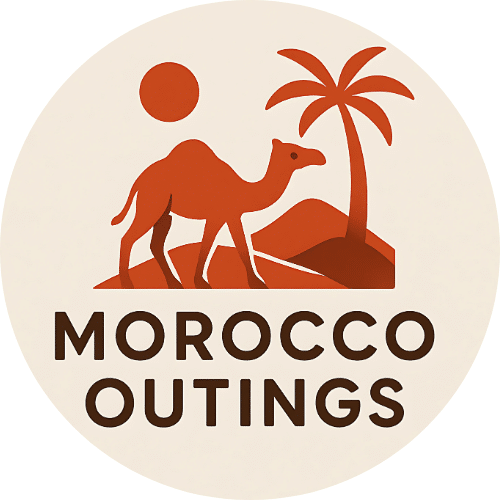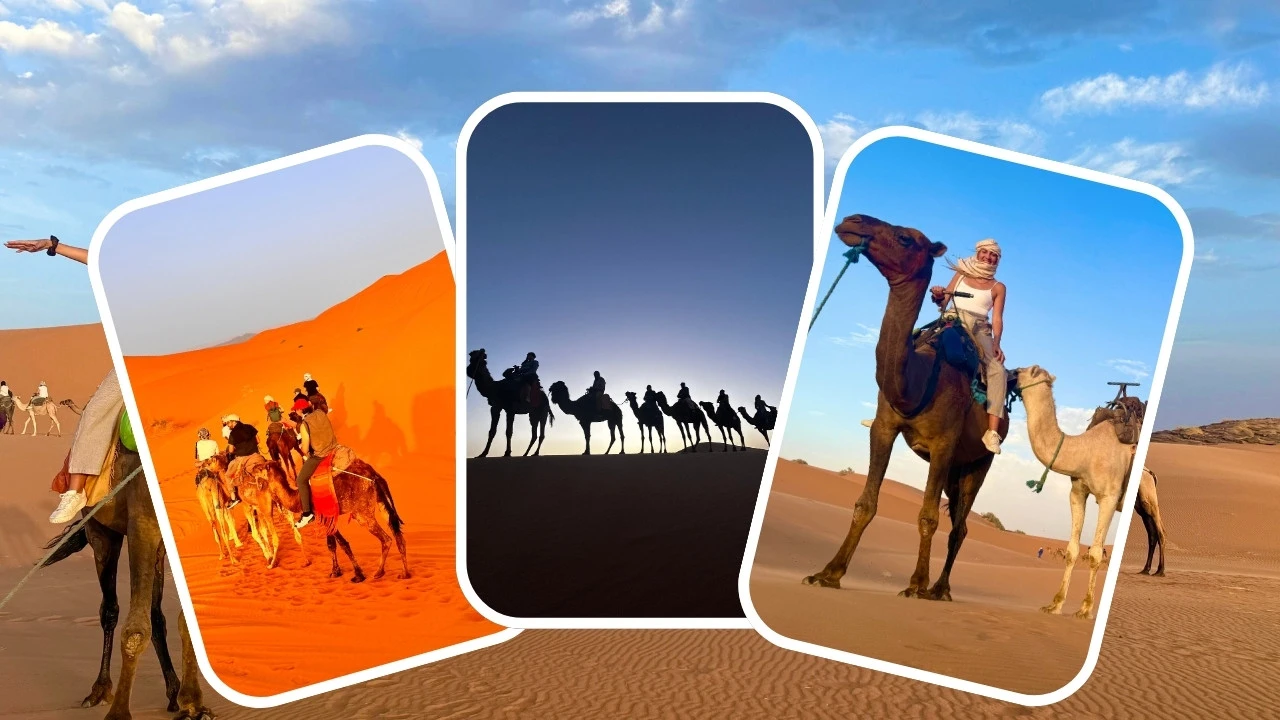Camel Rides Tours in Morocco
For thousands of years across North Africa, dromedaries (one-hump camels) have carried traders, storytellers, and nomadic families between oases, markets, and seasonal pastures. In Morocco, a camel ride is more than a photo op—it’s a window into Amazigh (Berber) and Saharan lifeways, whether you meander through Marrakech’s palm groves, watch the sun fall over a stone desert plateau, or crest the saffron dunes of the far south. These experiences help visitors understand how communities adapted to arid landscapes, long distances, and the rhythm of desert seasons.
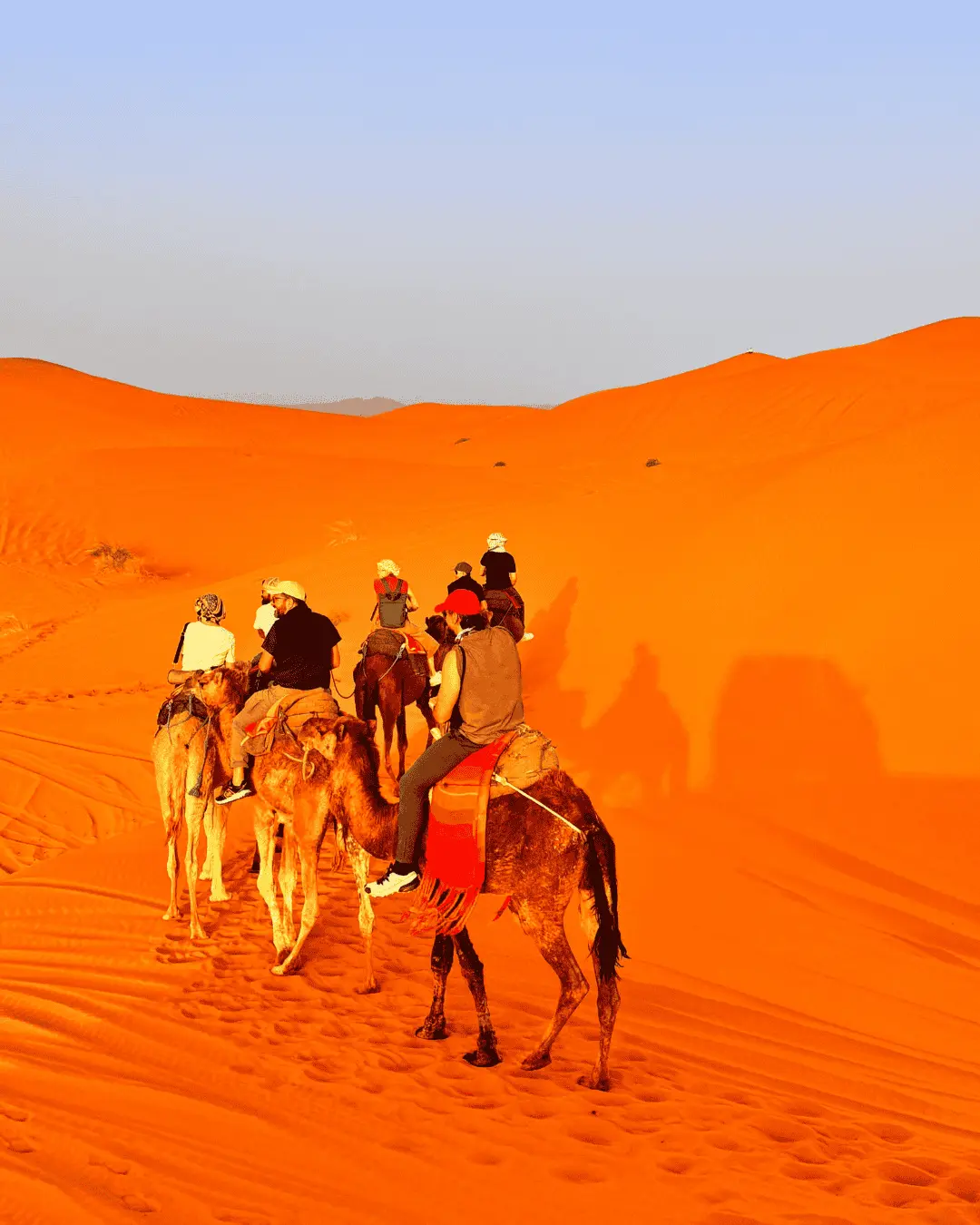
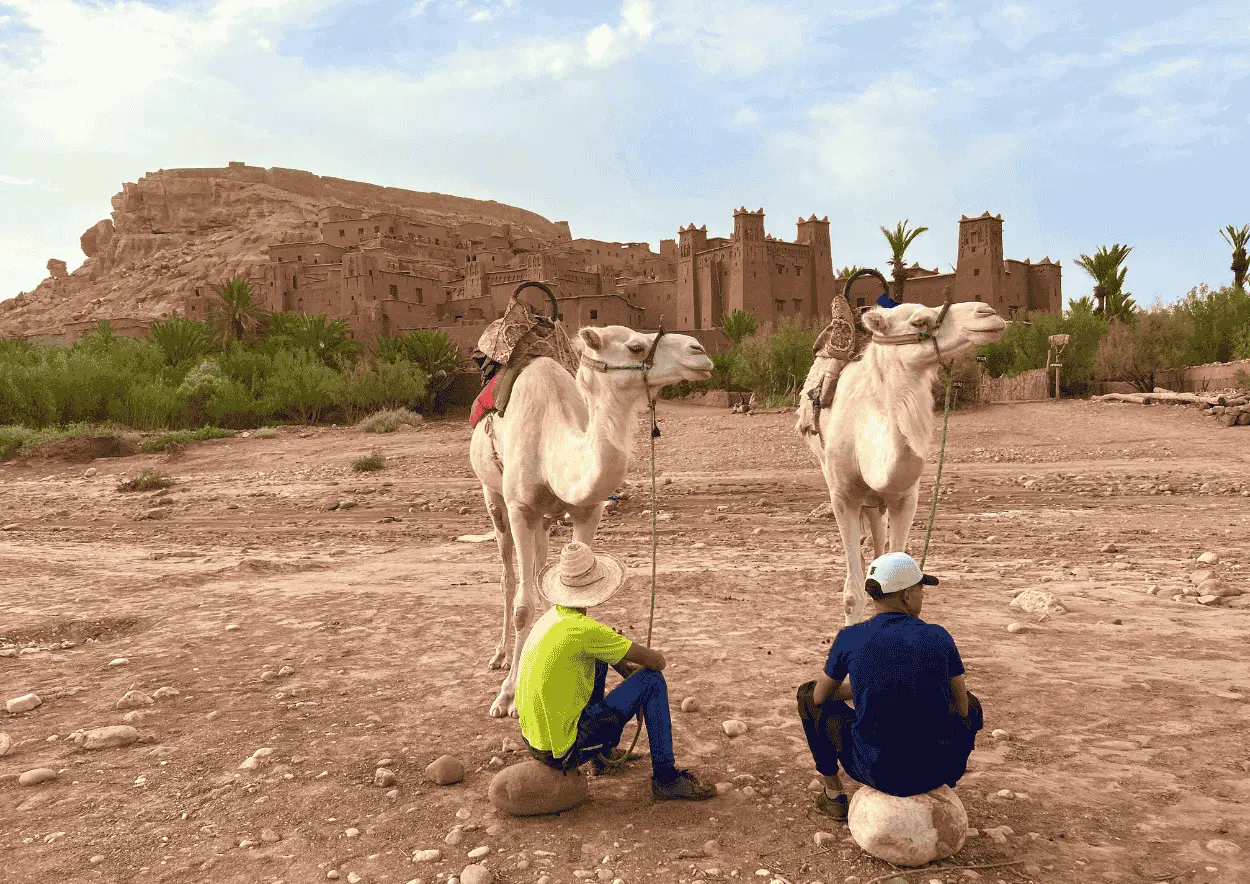
Can you ride camels in Morocco?
Yes. Morocco is one of the classic destinations on earth for camel riding, from short introductory loops near cities to multi-day treks in the Sahara. Around Marrakech you’ll find accessible rides in the Palmeraie (the historic palm oasis) and in the nearby Agafay, a “stone desert” with sweeping views of the High Atlas. For true dune country, travelers head farther south to Merzouga for Erg Chebbi’s golden waves or to the Draa Valley outposts of Zagora and M’Hamid for the wild expanse of Erg Chigaga. On the Atlantic, Essaouira offers gentle beach-and-dune routes that are ideal for first-timers. Guides show you how to mount and sit comfortably, lead the animals, and pace the ride for safety and enjoyment.
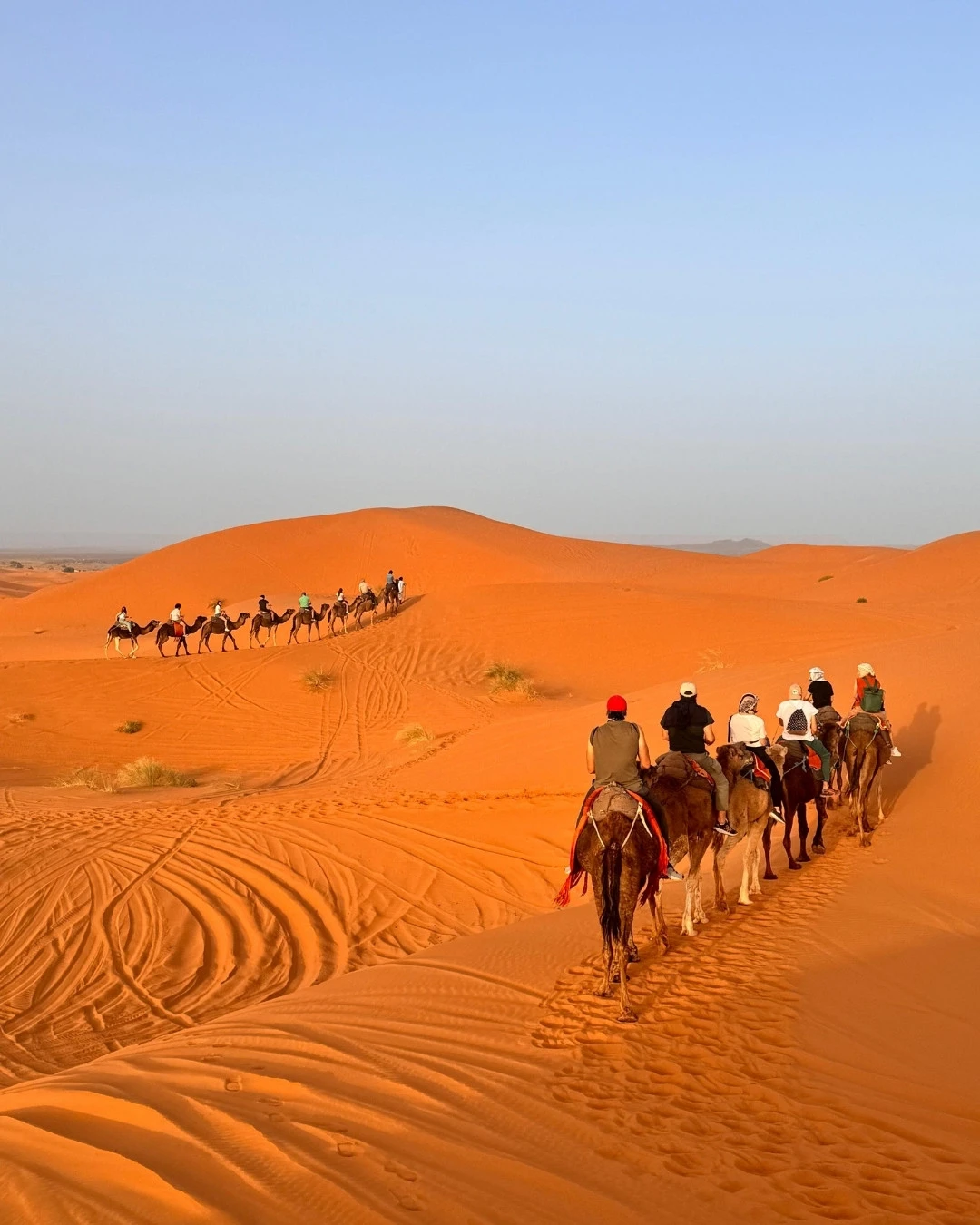
Where to ride a camel in Morocco?
There are many places in Morocco to experience a camel ride, each with its own landscape and style of outing. Near Marrakech, the Palmeraie provides shaded tracks among palm gardens and traditional farms; rides here are typically shorter and easy to fit into a half day. Agafay, about an hour from the city, offers wide horizons, sun-washed plateaus, and dramatic sunsets; rides often pair naturally with tea in a bivouac or a dinner under the stars.
If dunes are your dream, plan for the Sahara: Merzouga (Erg Chebbi) has classic crescent dunes and a full range of camps, while Zagora or M’Hamid are gateways to Erg Chigaga’s remote sands and multi-hour or multi-day caravans. On the coast, Essaouira’s breezy beaches and low sandhills make for relaxed ambles at cooler temperatures.
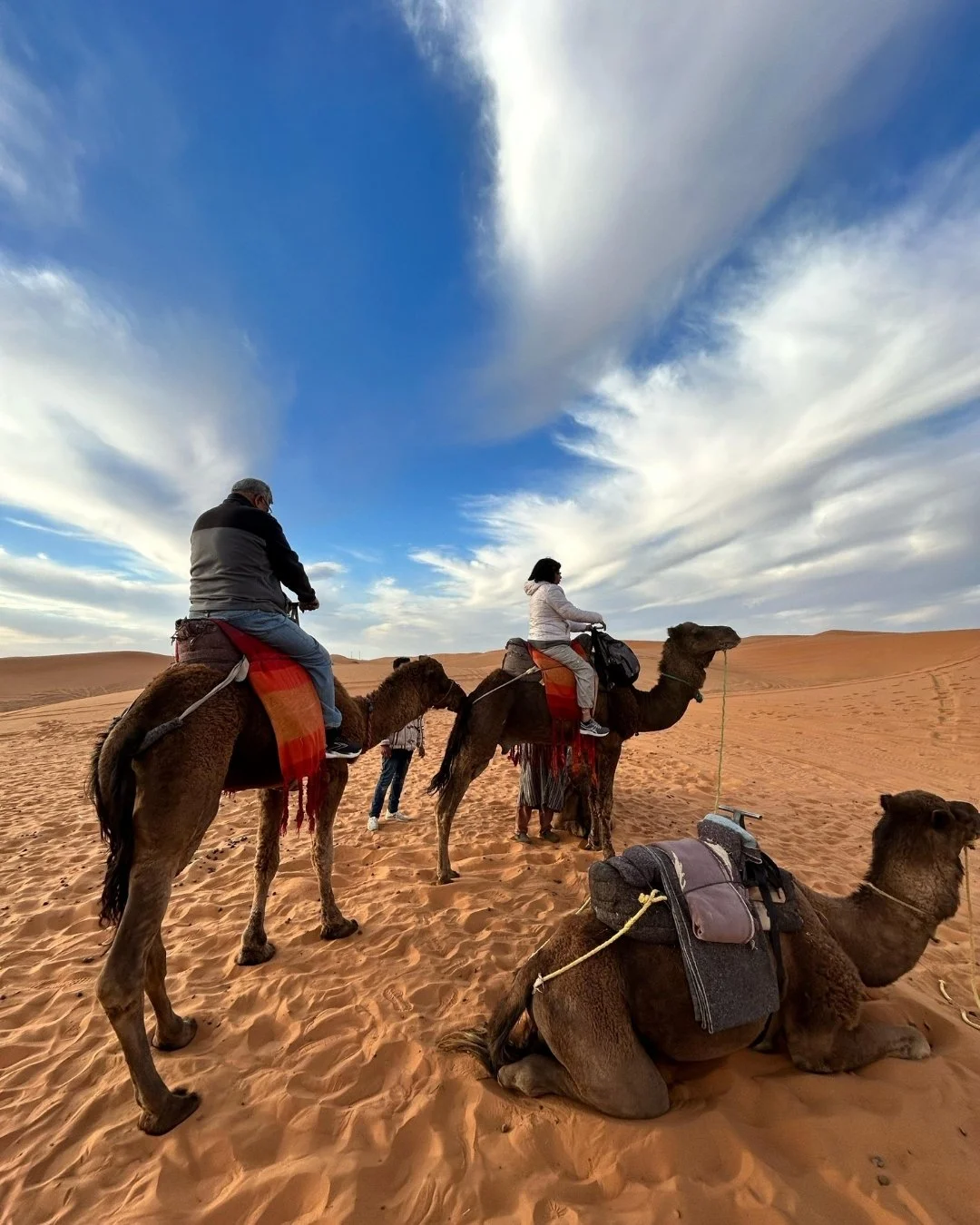
Not visiting Marrakech this trip? No worries! You can experience camel riding on Fes tours or Ouarzazate and continue south to the Sahara, with rides timed for sunset and sunrise. Beach towns such as Essaouira also run daily departures; inland oases like Skoura can arrange short rides among palm groves and kasbahs. In all of these places, rides are usually bookable as stand-alone activities or bundled with transportation, meals, and time for photos.
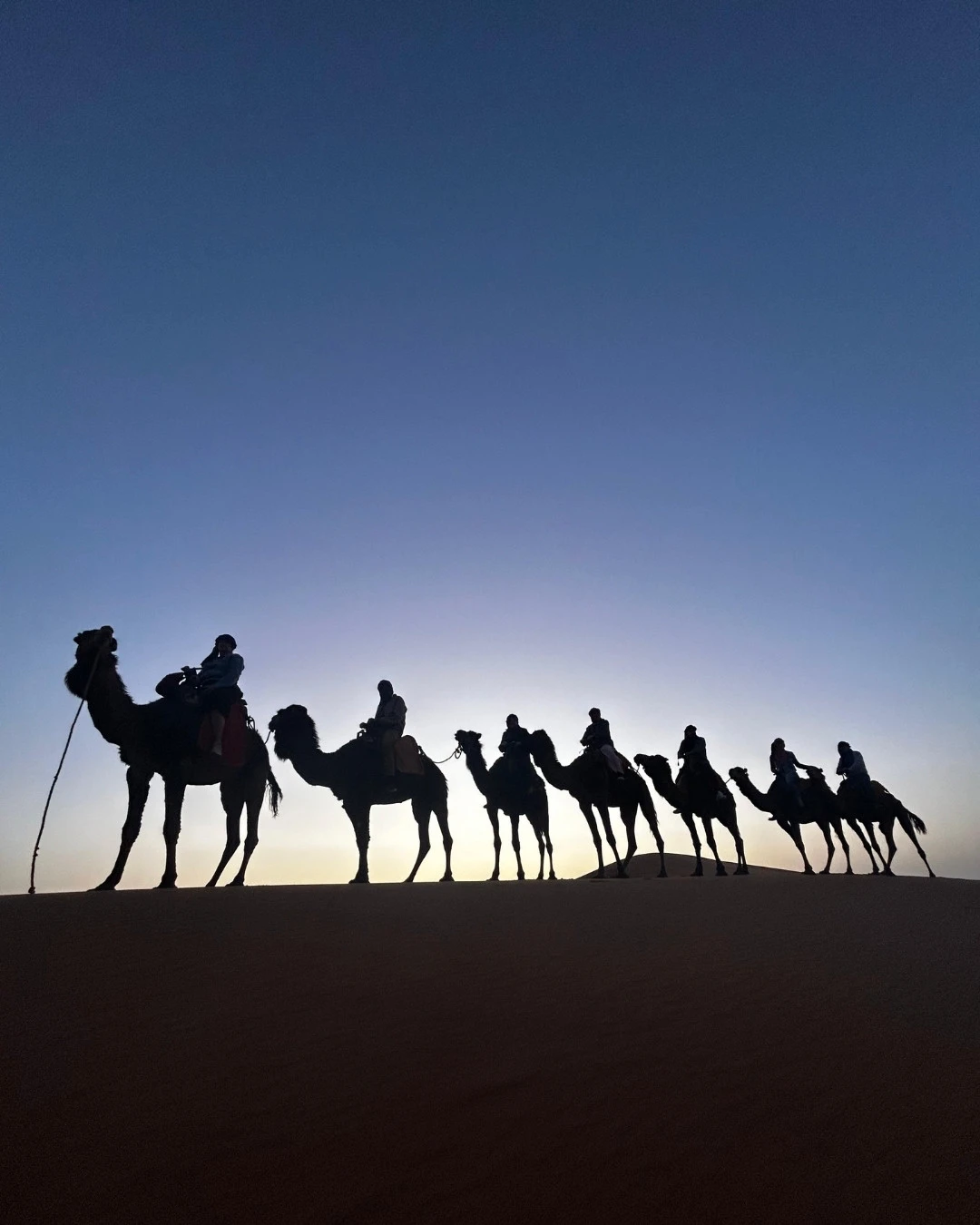
Can you ride a camel on the dunes?
Absolutely. Sunset and sunrise rides in the Sahara are signature Moroccan experiences. Guides typically schedule departures in the late afternoon to avoid peak heat, ride into the dunes for golden-hour views, and finish at a desert camp for dinner and music. Early the next morning, you ride or walk to a vantage point for the first light, then return for breakfast. Short rides of 30–60 minutes are common near cities; in the Sahara, plan for a longer experience that may include sandboarding, tea by a campfire, or stargazing. Always confirm what’s included before you go, and agree on timing, route, and services so the outing stays smooth and enjoyable.
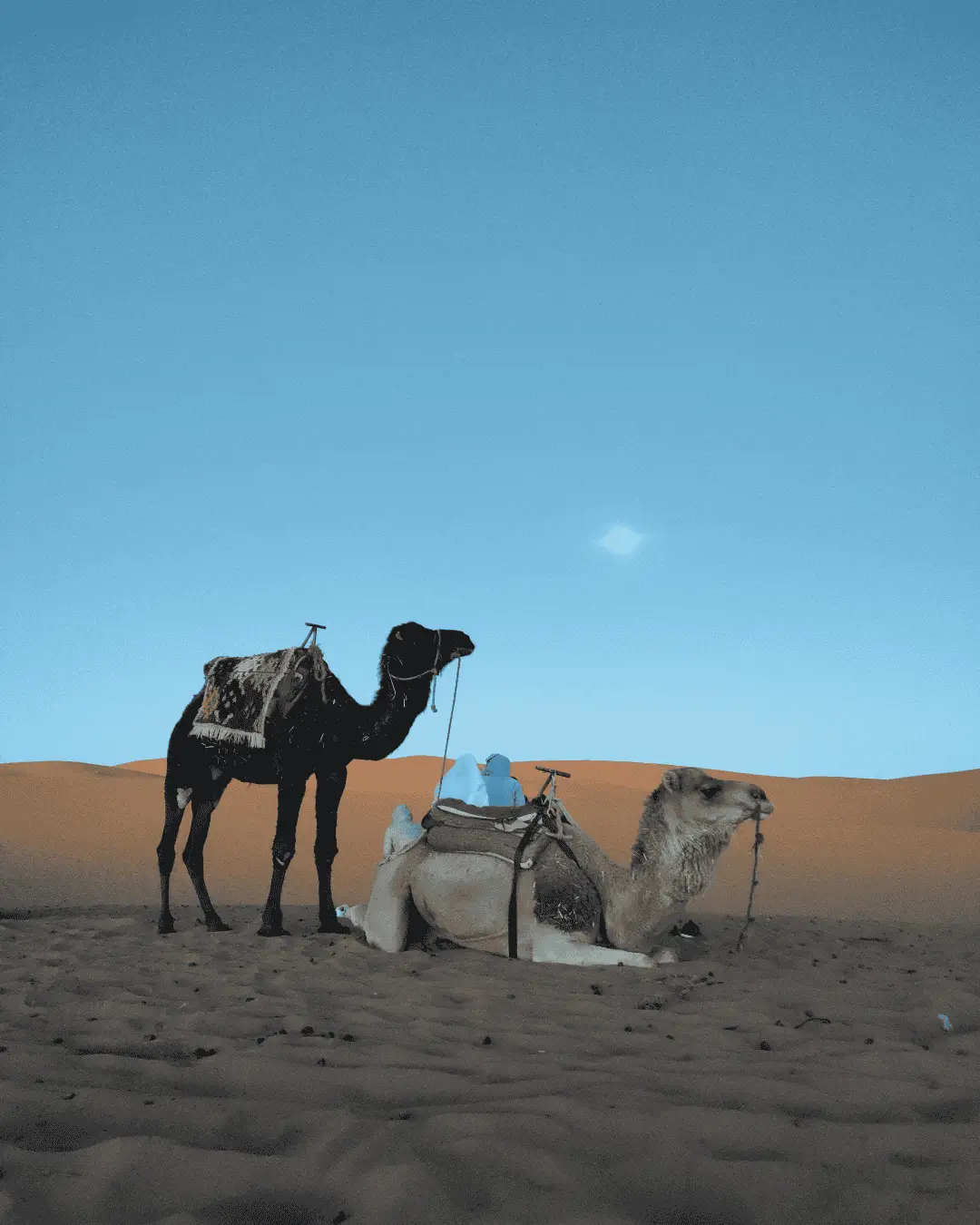
Camel rides on the Atlantic coast
On Morocco’s Atlantic shoreline, Essaouira is the top choice for beachside camel rides. The terrain here alternates between packed sand, low dunes, and argan scrub, with ocean breezes keeping temperatures pleasant for much of the year. Rides can be tailored for families and beginners, often at an easy pace with plenty of time for photos. Later in the day, when the light softens and the tide recedes, the beach becomes especially scenic. Some stables also offer half-day loops that combine quiet dune tracks, viewpoints over the coast, and tea stops.
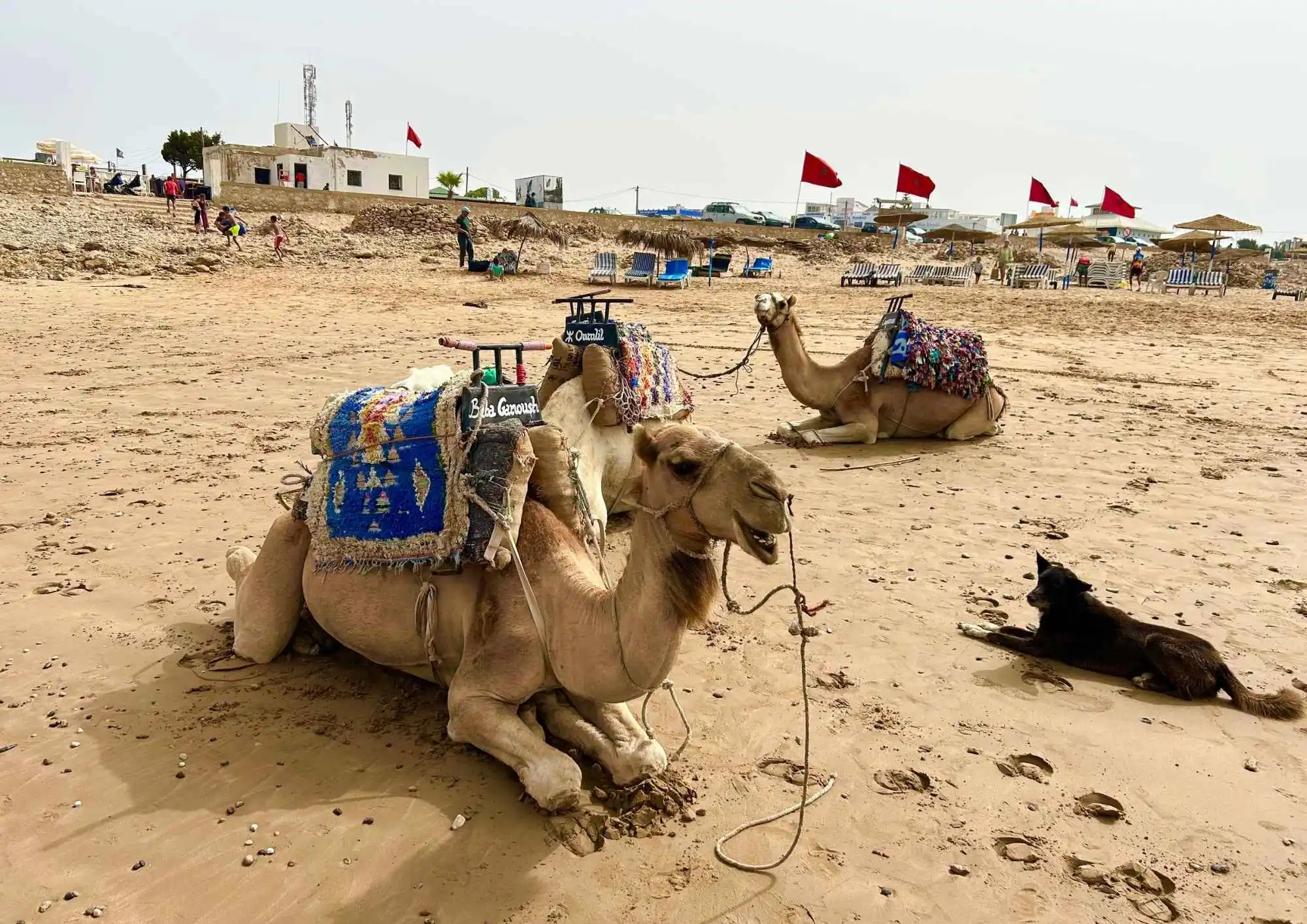
Camel rides near Marrakech (Palmeraie & Agafay)
In the Palmeraie, you’ll typically don a cheich (a desert scarf) for fun photos and sun protection, then follow palm-lined paths with a handler leading the camel. These are gentle, introductory rides suitable for most travelers. In Agafay, there are no sand dunes—the beauty lies in its rocky undulations, wide skies, and Atlas Mountain silhouettes. Many itineraries time the ride for sunset, then serve mint tea or a full dinner in a tented setting. Because rides don’t take place inside the city itself, operators include round-trip transfers from Marrakech; this keeps logistics easy and helps you avoid on-the-spot haggling.
Camel Ride in Morocco: Where to Book, Price & Tips
A camel ride in Morocco can range from about 100–600 MAD ($10–$60) per person for short/day rides, depending on the location, duration, and how you book. Overnight Sahara-camp packages that include camel transfers typically run 800–1,500+ MAD ($80–$150+) per person. Prices vary significantly between booking a tour package in advance versus haggling with independent handlers on-site.
Camel ride price factors
- Location:
- Marrakech Palmeraie and the nearby Agafay Desert are popular for short rides and sunset outings.
- Sahara dunes—Erg Chebbi (Merzouga) and Erg Chigaga (near M’hamid/Zagora)—offer classic sunrise/sunset treks and overnight camp experiences.
- Coastal spots like Essaouira or Agadir sometimes offer shorter beachside rides.
- Booking method:
- Booked tour packages: Reputable operators (or your riad/desert camp) often bundle camel rides into itineraries with transport and a clear schedule. You’ll pay a higher, fixed price, but get more structure and safety. Group size can lower the per-person rate.
- Independent vendors: Booking directly with a handler on-site requires strong bargaining skills. Negotiate all details beforehand—price, duration, route, inclusions, currency (MAD), and any photo stops—to avoid upselling mid-ride.
- Duration: Rides range from a quick 15–30 minute photo op to 1 hour+ treks; Sahara itineraries can include sunrise/sunset rides or overnight trips with camp stays.
- Add-ons: Some tours include sunset/sunrise viewpoints, mint tea, meals, sandboarding, quad biking, or a full desert camp package—each adds to the total cost.
Examples of camel ride pricing
- In Marrakech (Palmeraie & Agafay)
- Vendor price vs. “official” rate: Handlers near busy pickup spots may open high. Negotiate politely; you can often land a fair, all-in rate.
- Reported ranges:
- Short ride (15–30 min): ~100–200 MAD per person when negotiated on-site.1-hour ride: ~250–400 MAD on-site; 400–600 MAD via reputable operators with transport and set timing.
- Groups (4–6): often 200–300 MAD per person for a 1-hour ride when booked together.
- In the Sahara (Merzouga / Erg Chebbi; Zagora / Erg Chigaga)
- Sunset/sunrise trek (45–90 min): ~200–400 MAD per person when arranged locally.
- Overnight desert camp with camel transfer: typically 800–1,200 MAD per person for standard camps; 1,500–2,500 MAD+ for higher-end/private camps depending on amenities.
Important tips for a safe and fair experience
-
Agree on all terms in advance: Confirm duration, final price in MAD, inclusions (photos/tea/transport), and tipping expectations before you mount.
-
Use licensed operators: In Marrakech, book through established stables/co-ops, your riad, or well-reviewed agencies. In Merzouga/Chigaga, have your camp arrange a trusted handler.
-
Go with a group: Lowers the per-person price and adds a sense of security.
-
Expect to haggle: Don’t accept the first offer; stay polite, and be ready to walk away.
-
Remember to tip: In Morocco, tipping is customary—think 10–20 MAD for a short ride or around 10% for longer rides/great service.
What to wear and to pack on a camel rides in Morocco
-
Long, breathable pants (prevents chafing)
-
Lightweight long-sleeve or UPF shirt
-
Closed-toe shoes (sneakers/light hikers)
-
Scarf/cheich or neck gaiter for sun/wind
-
Hat or hood; sunglasses
-
Layer for temps: light jacket (evenings), warmer fleece/puffer in winter
-
Small daypack + 1–2 L water (more in summer)
-
Sunscreen + SPF lip balm
-
Hand sanitizer, tissues/wet wipes
-
Snacks (nuts/dates/energy bar)
-
Basic first-aid + any personal meds
-
Phone/camera with wrist strap, power bank
-
Cash and ID copy
-
Optional for sunset/overnight: headlamp, extra warm layer, sleep liner, flip-flops for camp, electrolytes
Popular tours include camel rides
Browse the list below for our top itineraries with camel rides, desert camps, and city-to-city travel:
- Marrakech desert tour 3 days
- Marrakech To Fes Desert Tour 3 Days
- 2 days desert tour from Fes to Merzouga
- 2 Days Desert Tour From Marrakech To Zagora
- Fes to Marrakech Desert Tour 3 Days
